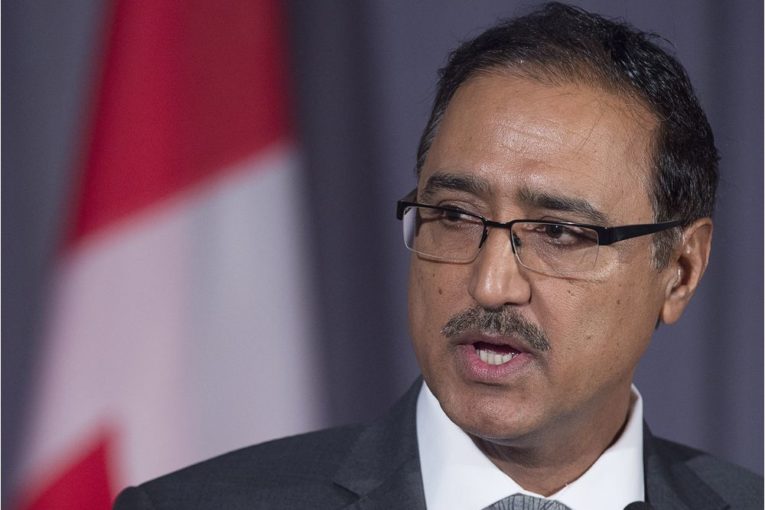
Natural Resources Minister Amarjeet Sohi is still feeling bullish about the prospects for the stalled Trans Mountain pipeline expansion.
For a project that’s been knocked down more times that an inflatable Bozo the Clown bop bag at a play school party, he’s displaying remarkable amounts of inner strength and outward optimism.
But it doesn’t answer the $4.5-billion question: When will the development be built?
After unveiling the first step Friday in Ottawa’s plan to restart the pipeline expansion, Sohi expressed confidence the development will get back on track.
Just don’t ask him exactly when.
Or precisely how.
“We don’t want to take hasty steps. We want to make sure that we are on a very sound foundation,” Sohi said in an interview.
“So putting timelines on specific aspects of the construction is, at this time in our mind, not something that we can talk about.”
In Halifax, the federal minister announced he’s instructed the National Energy Board to review the impact of the Trans Mountain expansion on marine shipping off the Pacific Coast.
The energy regulator was given 22 weeks to conduct “a thorough and prompt review” and deliver a report back to government.
That timeline puts the project’s progress on ice until at least the end of February.
Yet, potential appeals or reviews of further regulatory or government action could drag into late 2019 or beyond, something that deeply concerns the energy industry.
Sohi’s attempt to reactivate the project comes after the Federal Court of Appeal quashed the government’s permit for the project last month.
In a stunning ruling, the judges cited improper consideration by the NEB of the development’s impact on oil tanker traffic in the Burrard Inlet, and the government’s inadequate consultation with Indigenous communities.
Sohi’s announcement attempts to disarm the first flaw. It doesn’t address the more complicated concerns around Ottawa’s bungling of consultations with First Nations.
There are reports the feds want to hire a retired federal judge to oversee a new round of discussions with Indigenous communities, which is a smart move since bureaucrats and politicians made a royal mess of it initially.
Sohi said a second step in the government’s plan will be coming within days.
He won’t answer the question of whether construction — twinning the oil pipeline that it bought last month for $4.5 billion — will begin again at any point in 2019.
“It’s premature to speculate on the timing,” he said.
“My focus is not election cycles. My focus is not to take decisions that are done hastily that will jeopardize the viability of this project.”
With the next provincial election around the corner next spring, it’s impossible to separate politics from this issue.
The minister obviously wants to respect the independence of the NEB.
He doesn’t want to be seen as trying to predetermine the outcome of discussions with First Nations. That could open up another legal challenge.
However, the reality is Prime Minister Justin Trudeau has already said he supports the Trans Mountain expansion, believes it’s in the national interest, and has pledged to get it built.
The federal government’s unwillingness to commit to timelines or provide more certainty hangs over Alberta’s energy sector like a grey cloud, and there’s plenty of suspicion this project won’t get going again.
Premier Rachel Notley said she’s “a little bit skeptical” about the federal government’s new review process, but believes the 22-week timeline — if it holds — is reasonable.
Others aren’t so sure.
“For Albertans at this point, it’s buyer beware,” said political analyst David Taras of Mount Royal University.
“Albertans will be very reluctant to buy into anything the feds are selling until they see real, tangible progress.”
Meanwhile, pipelines are full and space is being rationed, record amounts of crude are being exported by rail, and the price discount for Western Canadian heavy oil closed at US$34.25 a barrel on Thursday.
Not only does the price differential cost the province billions of dollars a year, it’s impacting investment and jobs.
On Thursday, the executive vice-chairman of Canadian Natural Resources Ltd. said pipeline gridlock and an inefficient regulatory system are two of the major challenges confronting the oilsands sector.
“Canadian Natural is looking for more certainty on market access before we commit to new major projects to increase oilsands production,” Steve Laut told the Fort McMurray Chamber of Commerce.
In the oilpatch, reaction to Friday’s federal announcement was equally dour.
Gary Leach, president of the Explorers and Producers Association of Canada, called the 22-week NEB review period “disappointingly long.”
It’s also “irrationally exuberant” to suggest the new marine review process will help get the project built quickly, he said.
“Nothing is ever final in this country, no matter what level it’s decided at,” Leach said.
The cynicism is well earned.
The demise of Northern Gateway and Energy East projects still sting in the sector. Delays that have sidetracked Keystone XL and Trans Mountain have made many Alberta doubtful any large energy infrastructure can be built.
As an Edmonton MP, Sohi knows Albertans are frustrated.
But he’s not losing hope.
“I am confident that if we take the right step, that if we follow the right procedures … that we’ll be able to have a path forward,” the minister added.
“I understand the concern, but I also don’t share the pessimistic view of some people.”
It’s a good thing Sohi is an optimist.
It will help balance the scales of an increasingly skeptical province.
Chris Varcoe is a Calgary Herald columnist.
You can read more of the news on source
